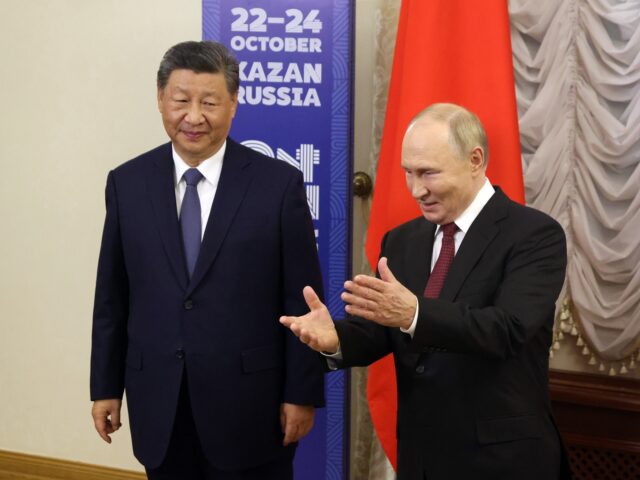Best Friends: Putin Gives Xi Jinping Top Billing at Anti-U.S. BRICS Summit
 Contributor/Getty Images
Contributor/Getty Images
Russian strongman Vladimir Putin held an hour-long meeting with Chinese dictator Xi Jinping on Tuesday in the sidelines of the ongoing BRICS summit, describing China-Russia relations as an example to the world and a “stabilizing” force in the world.
The extended meeting, both Chinese and Russian media insisted, was meant to portray the two countries as unshakeable allies. Neither side publicly discussed potential points of contention in their relationship, most recently Putin’s efforts to bring traditional Chinese vassal North Korea into Russia’s political orbit.
This year’s BRICS summit is expected to welcome dozens of heads of state, including the nine members of the anti-Western alliance, but the first day was dedicated to host Putin greeting arriving leaders and a closed-door meeting of the leaders of BRICS members only. The alliance is named after its five core members – Brazil, Russia, India, China, and South Africa – but welcomed Egypt, Ethiopia, the United Arab Emirates (UAE), and Iran to the fold in January.
Russia holds the chairmanship of BRICS for 2024 and is hosting the high-level summit in the city of Kazan, the regional capital of Tatarstan.
The Russian government has made clear that a major geopolitical goal for the summit is to prove that Russia is far from isolated in the world and that Western sanctions on Moscow, imposed in response to its various human rights abuses in the ongoing invasion of Ukraine, had only a minimal effect on Russian diplomacy. The Russian Foreign Affairs Ministry announced that Putin gave one-on-one audiences to Indian Prime Minister Narendra Modi, South Africa, President Cyril Ramaphosa, Egyptian strongman Abdel Fattah al-Sisi, and disgraced former president of Brazil Dilma Rousseff, who runs the BRICS “New Development Bank.”
Putin spent the most time with Xi, however, and both Xi and Putin portrayed their mutual relationship as the most important one within the BRICS structure. The Russian news agency Tass reported that Putin and Xi held a private conversation for an hour, but offered few details on the nature of the conversation.
The Kremlin published transcripts of the opening remarks in the meeting, in which both sides offered lavish praise for their bilateral ties.
“We can assert with complete confidence that these relations have become a paradigm of how inter-state relations should be constructed in the modern world,” Putin declared. “Our multifaceted cooperation is characterised by equality, mutual benefit, and an absolutely non-conformist nature.”
Putin claimed that “Russian-Chinese cooperation in global affairs” – which has manifested in support for, among other nefarious causes, the Russian invasion of Ukraine, the genocidal terrorists of Hamas, and the aforementioned North Korean communist regime – was among the “main stabilizing factors in the international arena.”
“We intend to further expand coordination at all multilateral platforms to ensure global security and promote a fairer world order,” Putin promised.
In his remarks, Xi said he was looking forward to “first and foremost” engaging Putin at the BRICS summit and congratulated both China and Russia for having “taken the right path” to cooperation.
“Over the past decades, China-Russia relations have withstood the test of a changing international situation, come a long way and acquired an unprecedented character,” Xi was quoted as saying.
“During this unprecedent tectonic transformation, unseen for centuries, the international situation is undergoing serious changes and upheavals,” Xi continued. “However, this cannot shake my conviction that the strategic choice of the two countries in favour of firm mutual support, the deep centuries-old friendship between our countries, and China and Russia’s sense of duty as great powers are inviolable.”
Xi independently applauded BRICS itself for promoting “inclusive economic globalization.”
While wishing Putin success as host, the Global Times, a state propaganda outlet that often acts as a mouthpiece for Beijing, published commentary on Wednesday local time declaring China the most important member of BRICS and the arbiter of the future of the coalition. China, the outlet claimed, “has made a remarkable contribution to push forward the organization’s growth.”
“China is undoubtedly one of the key drivers of the BRICS development,” the Global Times boasted, citing a Russian official.
Absent from coverage of Putin’s meeting with Xi was the mention publicly of any specific international topic, including both nations’ close ties to North Korea. Putin made his first trip to Pyongyang in over two decades this summer, receiving a warm welcome from dictator Kim Jong-un and signing a mutual defense treaty with the communist country. While ties to Russia have improved, North Korea’s relationship with China has strained – something both Xi and Kim have hinted at in public statements.
Reports from Kazan and expert analysis in anticipation of the summit suggest that Russia and China, along with their BRICS peers, will prioritize the topic of what to do with the dozens of countries reportedly seeking membership – who to allow into the club, and the potential creation of a lower BRICS “partner” status for friendly states the members do not want to fully integrate into the system. Countries that reports have mentioned as being interested in potential membership include a variety of rogue states, most prominently the Latin American dictatorships of Venezuela and Cuba. Other nations that have expressed interest in the coalition include NATO member Turkey and socialist autocracy Zimbabwe.
The BRICS countries are also expected to address the creation of a parallel international payment system to override sanctions and the ongoing war between Israel and the genocidal terrorist organization Hamas, which relies heavily on support from BRICS member Iran.
Follow Frances Martel on Facebook and Twitter.
Source link

